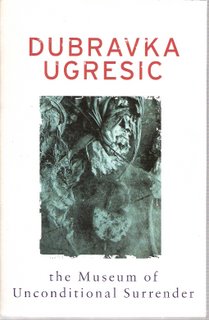 Review: The Museum of Unconditional Surrender, Dubravka Ugresic (1998)
Review: The Museum of Unconditional Surrender, Dubravka Ugresic (1998)Memories reach out to us across the multiple planes of this narrator’s experience. It seems to take a whole family, plus a whole circle of acquaintances, to construct a reliable script for the past to act itself out with. Ugresic begins the reconstruction of the past in an exile’s rooming house, and works back and forth across time, across continents, reaching first of all into the life of her mother, and into her own childhood, for the necessary materials.
Like the dolls she used to make as a girl in Yugoslavia, using scraps of precious cloth that were given to her by the local dressmaker, Ugresic stitches together a meaningful profile that satisfies essential requirements, that faithfully describes what it has meant to be human in an inhuman world.
The domestic has never seemed so powerful, as the minutiae of life are resurrected from oblivion and placed in a reliable frame of words.
And as an academic might, she shakes quotations out of the satchel of her experience that link her reality with the realities of people who have lived in the past. Her act of bricolage serves to create a living present that is both rich in associations and that reverberates with our own.
The personal becomes the universal. The one becomes the many. The multitude all owe some allegiance to a unified whole. It is a magical operation, of uncommon grace and beauty, to forge such strong ties with people you have never met, who are from other cultures, and who most likely will never meet you.
In parts of the novel, Ugresic gives us portraits of people she has known in her exile, and delineates the frustrations, the obstacles to happiness that she encounters over the years. Looking for home, remembering home.
Especially memorable is Lucy whose father was Polish and who is passionate to excess, and the Indian girls with whom the narrator is forced to cohabit a dorm at an American college. When anger seeps into her narrative, we sit up and take notice, recognising a shared emotion, able to partake, once again, in her life’s drama.
And this drama resembles nothing less than one that we may have constructed from our own memories. Despite, or because of, the specifics of each of the stories, they charm us. The East German she lives with for two months in America, whose wandering trajectory takes her across the whole of Europe. The ageing lesbians, one from Eastern Europe, one American, who are surrounded by Mickey Mouse emblems. Antonio, the young Portuguese she meets before attending a Lisbon literary conference.
Recounting these stories, she seems to be assembling a vocabulary of remembering, creating a vernacular of memory that will transcend time and help her — and us — achieve peace in the present. Who are we? Are we merely an accretion of everything that has gone before? How do we weave together into one strong strand the disparate threads of our existence?
How to live in the present, and confront the future, if we can make no sense of the past? Where do we belong? Is having a homeland an essential element of happiness? In a globalised world, what does it mean to be an individual, a citizen? Where to put down roots where no firm ground exists?
These are interesting questions, and Ugresic’s book throws up many such. The Wikipedia contains details of Ugresic’s life, her self-imposed exile and her current activities.
Ugresic’s experiences are her own, although they perhaps belong to others of her countrymen as well. She is a fine writer. This book is wonderful and I would recommend it to anyone.
She creates a sense of Eastern Europe that perhaps no novelist has created before. Not only is it inclusive, but it is also not exclusive. By featuring in the specific details of the Eastern European experience, she has written a book for the world.
No comments:
Post a Comment